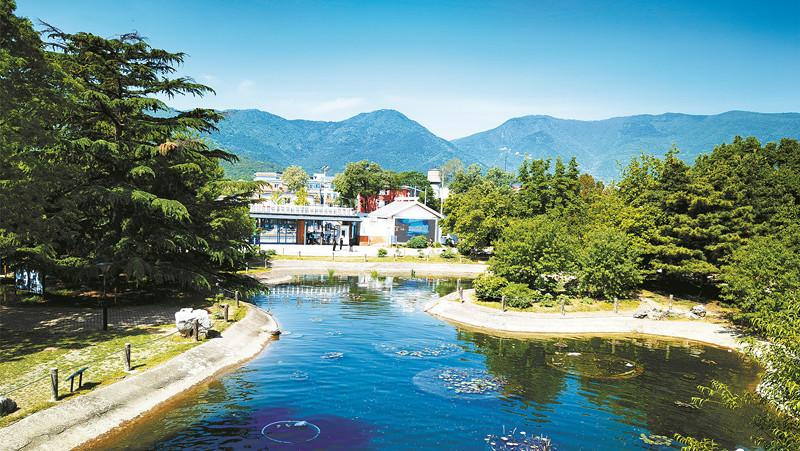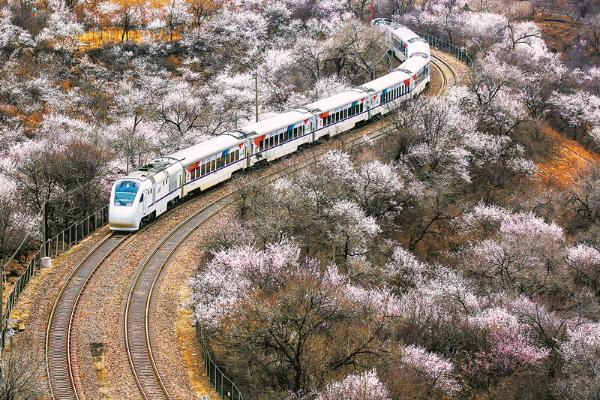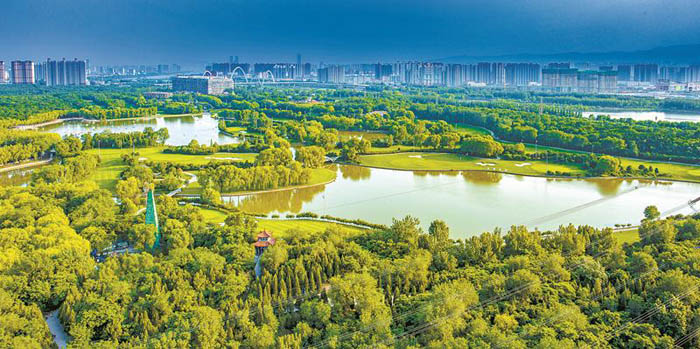
基于景观偏好理论的公园绿地植物景观
编号
lyqk008848


中文标题
基于景观偏好理论的公园绿地植物景观


作者单位
浙江农林大学风景园林与建筑学院 杭州 311300


期刊名称
中国城市林业


年份
2021


卷号
19


期号
2


中文摘要
文章基于景观偏好理论,以杭州柳浪闻莺公园为例,通过问卷调查了公众对植物景观的偏好情况,用SPSS20.0对调研结果进行描述性统计、卡方分析、方差分析、相关性分析。研究结果表明:1)公众对不同地表特征的林下群落植物空间偏好具有差异,偏好结果为道路类型空间(M=3.91)>草坪类型空间(M=3.82)>亲水类型空间(M=3.56)>铺装类型空间(M=3.42);2)年龄、访问公园的频率以及对植物的关注度会显著影响偏好结果;3)植物颜色数量、植物种类丰富度、植物群落结构、植物空间视线开敞与植物景观空间的偏好得分显著相关。最后,基于以上基础,探讨了如何营造更符合公众偏好的植物景观。


基金项目
浙江省重点研发项目浙江省乡村生态景观营造技术研发与推广示范(2019C02023)


英文标题
Plant Landscape of Park Green Space Based on Landscape Preference Theory


作者英文名
Lin Zhihao, Yao Xingda, Yang Fan, Bao Zhiyi


单位英文名
School of Landscape and Architecture, Zhejiang Agriculture and Forestry University, Hangzhou 311300, China


英文摘要
This paper investigates the public preference for plant landscape in Liulang Wenyi Park of Hangzhou through questionnaires and carries out the descriptive statistics, chi-square analysis, analysis of variance and correlation analysis with SPSS20.0 based on the theory of landscape preference. The following results are obtained: 1) The public have different spatial preferences for understory plant communities which have different surface features. The preference result is road space (M=3.91) > turf space (M=3.82) > hydrophilic space (M=3.56) > pavement space (M=3.42); 2) age, frequency of visits to parks, and attention to plants can significantly affect the preference; and 3) Preference scores of the number of plant colors, plant species richness, plant community structure, plant space sight and plant landscape space are significantly correlated. On this basis, we explore how to create a plant landscape in public preference.


英文关键词
landscape preference;plant landscape;space;park green space


起始页码
68


截止页码
72


投稿时间
2019/8/16


作者简介
林志浩(1994-),男,硕士生,研究方向风景园林与景观设计。E-mail:834511071@qq.com


通讯作者介绍
包志毅(1964-),男,教授,博士,研究方向为植物景观规划设计。E-mail:bao99928@188.com


E-mail
bao99928@188.com


DOI
10.12169/zgcsly.2019.08.16.0002


参考文献
[1] 苏雪痕.植物造景[M].北京:中国林业出版社,1994.
[2] 晏海.城市公园绿地小气候环境效应及其影响因子研究[D].北京:北京林业大学,2014.
[3] SANESI G,PADOA-SCHIOPPA E,BOTTONI L,et al.Avian ecological diversity as an indicator of urban forest functionality:results from two case studies in northern and southern Italy[J].Arboriculture & Urban Greening,2009,35(2):80.
[4] TSUCHIYA K,OKURO T,TAKEUCHI K.The combined effects of conservation policy and co-management alter the understory vegetation of urban woodlands:a case study in the Tama Hills area,Japan[J].Landscape & Urban Planning,2013,110:87-98.
[5] MCPHERSON E G,SIMPSON J R.Potential energy savings in buildings by an urban tree planting programme in California[J].Urban Forestry & Urban Greening,2003,2(2):73-86.
[6] LOHR V I,PEARSON-MIMS C H,TARNAI J,et al.How urban residents rate and rank the benefits and problems associated with trees in cities[J].Journal of Arboriculture.2004,30(1):28-36.
[7] NOWAK D J,CIVEROLO K L,RAO S T,et al.A modeling study of the impact of urban trees on ozone[J].Atmospheric Environment,2000,34(10):1601-1613.
[8] THOMPSON C W. Linking landscape and health:the ecurring theme[J].Landscape and Urban Planning,2011,99(3/4):187-195.
[9] HAMI A,TARASHKAR M.Assessment of women's familiarity perceptions and preferences in terms of plants origins in the urban parks of Tabriz,Iran[J].Urban Forestry & Urban Greening,2018,32:168-172.
[10] POLAT A T,AKAY A.Relationships between the visual preferences of urban recreation area users and various landscape design elements[J].Urban Forestry & Urban Greening,2015,14(3):573-582.
[11] JIANG B,CHANG C Y,SULLIVAN W C.A dose of nature:tree cover,stress reduction,and gender differences[J].Urban Forestry & Urban Greening,2014,132:26-36.
[12] SUPPAKITTPAISARNP,JIANG B,SLAVEBAS M,et al.Does density of green infrastructure predict preference?[J].Urban Forestry & Urban Greening,2019,40:236-244.
[13] ZUBE E H,SELL J L,TAYLOR J G.Landscape perception:research,application and theory[J].Landscape Planning,1982,9(1):1-33.
[14] KAPALAN A,TASKIN T,ÖNENCC A.Assessing the visual quality of rural and urban-fringed landscapes surrounding livestock farms[J].Biosystems Engineering.2006,95(3):437-448.
[15] ZHAO J W,XU W Y,LI R J.Visual preference of trees:the effects of tree attributes and seasons[J].Urban Forestry & Urban Greening,2017,25:19-25.
[16] DUH Y,JIANG H,SONG X J,et al.Assessing the visual aesthetic quality of vegetation landscape in urban green space from a visitor's perspective[J].Urban Planning,2016,142(3):04016007.
[17] WANG R H,ZHAO J W,MEITNER M J.Urban woodland understory characteristics in relation to aesthetic and recreational preference.[J].Urban Forestry & Urban Greening,2017,24:55-61.
[18] SUPPAKITTPAISARN P,CHANG C Y,DEAL B,et al.Does vegetation density and perceptions predict green stormwater infrastructure preference?[J].Urban Forestry & Urban Greening,2020,55:126842.
[19] CHANG Y C,LI D Y,JANE H A.Wild or tended nature?the effects of landscape location and vegetation density on physiological and psychological responses[J].Landscape and Urban Planning,2017,167:72-83.
[20] WANG R H,ZHAO J W,MEITNER M J,et al.Characteristics of urban green spaces in relation to aesthetic preference and stress recovery[J].Urban Forestry & Urban Greening.2019,41:6-13.
[21] 王志芳,蔡扬,张辰,等.基于景观偏好分析的社区农园公众接受度研究:以北京为例[J].风景园林,2017(6):86-94.
[22] 刘瑞雪,许晓雪.城市公园植物景观空间活力及环境因素影响研究[J].中国园林,2018,34(增2):161-165.
[23] 刘颂,徐弘婧.城市公园环境熟悉度对景观偏好的影响研究:以上海市梦清园为例[J].中国城市林业,2018,16(1):30-33.


PDF全文
浏览全文


-
相关记录
更多
- 基于城市印象理论的道路植物景观彩化规划 2024
- 开放共享视角下城市综合公园质量评价与更新 2024
- 视听交互下城市绿地鸟鸣声景对感知偏好的影响 2024
- 城市公园绿地空间布局公平性研究 2024
- 应对气候变化的城市公园绿地低碳景观提质增效方法——以西安白马河公园为例 2023
- 公众植物景观感知与保护亲力行为意愿关系 2023
 打印
打印


